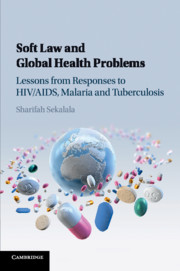
-
Select format
-
- Publisher:
- Cambridge University Press
- Publication date:
- June 2017
- May 2017
- ISBN:
- 9781107278950
- 9781107049529
- 9781107627598
- Dimensions:
- (228 x 152 mm)
- Weight & Pages:
- 0.62kg, 328 Pages
- Dimensions:
- (229 x 152 mm)
- Weight & Pages:
- 0.48kg, 328 Pages
- Subjects:
- Medico-Legal, Bioethics and Health Law, Law, Human Rights
You may already have access via personal or institutional login- Subjects:
- Medico-Legal, Bioethics and Health Law, Law, Human Rights
Book description
Various legal approaches have been taken internationally to improve global access to essential medicines for people in developing countries. This book focuses on the millions of people suffering from AIDS, tuberculosis and malaria. Beginning with the AIDS campaign for antiretroviral (ARV) drugs, Sharifah Sekalala argues that a soft law approach is more effective than hard law by critiquing the current TRIPS flexibilities within the World Trade Organization. She then considers how soft law has also been instrumental in the fight against malaria and tuberculosis. Using these compelling case studies, this book explores lawmaking on global health and analyses the viability of current global health financing trends within new and traditional organisations such as the United Nations, the World Health Organization, UNAIDS, UNITAID and The Global Fund. This book is essential reading for legal, development, policy and health scholars, activists and policymakers working across political economy, policy studies and global health studies.
Reviews
'The book … is an important contribution to a critical assessment of how well international law serves its purpose on the normative level. Using the global reaction to the global problems of HIV/AIDS, tuberculosis, and malaria, the author makes a strong contribution both on theoretical and empirical levels.'
Sigrun Skogly Source: Journal of Law and Society
'In her impressive monograph Soft Law and Global Health Problems, Sharifah Sekalala offers an innovative and meticulously argued legal perspective on the struggle over intellectual property and access to essential medicines in the global south.'
John Harrington Source: Social and Legal Studies
Contents
Metrics
Altmetric attention score
Full text views
Full text views help Loading metrics...
Loading metrics...
* Views captured on Cambridge Core between #date#. This data will be updated every 24 hours.
Usage data cannot currently be displayed.
Accessibility standard: Unknown
Why this information is here
This section outlines the accessibility features of this content - including support for screen readers, full keyboard navigation and high-contrast display options. This may not be relevant for you.
Accessibility Information
Accessibility compliance for the PDF of this book is currently unknown and may be updated in the future.


